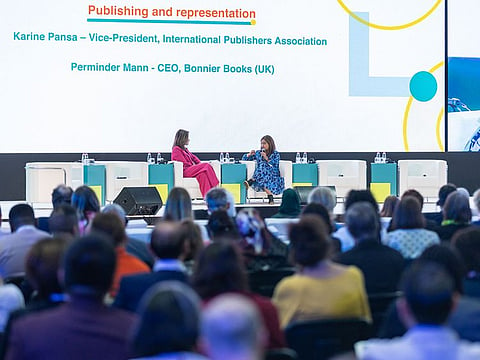Sweeping changes in publishing industry come under sharp focus in Sharjah
Day 2 of SIBF Publishers Conference tracks progress in inclusivity and representation

Sharjah: Pathways to diversity, inclusivity and equality in the publishing industry were in focus on Day 2 of the 12th Sharjah International Book Fair (SIBF) Publishers Conference where, in a fireside chat, Karine Pansa, Vice-President of the International Publishers Association (IPA) and Perminder Mann, CEO, Bonnier Book (UK), explored the various ways the sector is breaking down barriers to attract people from all backgrounds.
In a one-to-one conversation organised by Sharjah Book Authority at Expo Centre Sharjah, Pansa, the successor to the presidency of IPA, highlighted the organisation’s efforts in building a more inclusive publishing industry.
Describing her experience of interacting with women in international publishing under the framework of PublisHer network, Pansa said: “It was very inspiring to talk and listen to the voices of women publishers from around the world. As a publisher myself, this was a rewarding experience as we gain to learn so much from their world views, their aspirations, and their hopes for the industry.”
Mann talked about her passion and tireless efforts to ensure that her company culture is as inclusive as possible, from the way the company recruits to how they commission and publish.
Mann, who prefers the term ‘representation’ instead of ‘diversity’, said: “Representation within publishing is a commercial, social and moral imperative. Publishing is a global business and as we aspire for content that inspires, informs and educates readers from all walks of life, we also need a workforce who can represent the readers we are looking to connect with. Such representation will not only bring financial benefits; it ensures that as publishers, we continue to remain relevant and sustainable.”
To bridge gaps and broaden the appeal of the industry, the CEO of Bonnier Book said the company “is investing heavily in unconscious bias training to remove such barriers in commissioning and to have representation throughout the whole value chain including sales, marketing, and public relations.”
She added that the organisation has also identified gaps in its portfolio - for instance, in the new market of readers in the business smart thinking space, and is currently broadening its appeal in this traditionally male sector with a gendered representation from varied cultures.
Multilingual publishing in the Maghreb
The challenges and opportunities impacting the multilingual expanse of Maghreb or the Arab-speaking nations in North Africa was highlighted in the session titled, ‘Publishing in Northern Africa’, moderated by Wafaa Thabet Mezghani, a publishing consultant, children’s writer, and editor, Tunisia.
Tarik El Slaiki, Director of Slaiki Publishing, Morocco, described the multiplicity of languages that exist in North Africa as “an important cultural wealth”. He said: “This linguistic and cultural diversity is a source of creativity and openness - it offers us multiple visions of the world and allows us to draw on our common cultural values.”
El Slaiki added that “fear of failure” is a key factor preventing Arab publishers from translating Arabic works into other languages. “We need content that respects the culture and identity of young generations and financial support from governments is essential to break into new markets.”
Stating that Africa is a continent with a very high linguistic diversity, Hafed Boujmail, Nervana Publishing, Tunisia, said that the local dialect of Tunisia is now gaining prominence when compared to the previous generation who mastered French and Arabic.
He added: “Creativity is the essence of language; where there is no innovation, language will fade. We need more state support to translate from Arabic into Spanish, English and French as currently in Tunisia, all translation is largely from other languages into Arabic.”
Discussing the multiplicity of dialects in Algeria as a key challenge for publishers, Hassane Bennamane, Dar Al Omah, Algeria, said the current movement towards Arabisation is designed to preserve the legacy and heritage of the country.
He added: “The North African countries opened the door to lead European countries into Africa and the use of French language in these countries has enriched society because this confluence of cultures leads to dialogue and amalgamation between East and West civilisations.”
He added that the book market in the Arab world looks very promising, and that Algeria - for the first time - introduced English in educational institutions, in addition to its Arabic and French curriculum.



